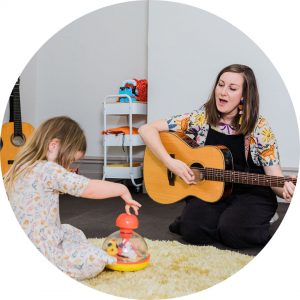Music therapy is a profession where music is used to support people to improve their health, functioning and wellbeing.
Music therapists are musicians who have trained at university to understand how music can have an effect on behaviours, on how people feel and how people think. Music therapists work with people to make goals to be worked on in music therapy. These goals might be communication goals, social goals, movement goals, mood and feelings goals, and/or spiritual goals.
In a music therapy session people might sing, play instruments, dance, write their own songs and record them, perform, listen and talk about music. Some of the places music therapists work in are schools, day services, community centers, hospitals and in people’s homes. Music therapy sessions might be individual or in a group.
Registered Music Therapists (RMTs) work in the following areas:
- mental health with people of all ages from all backgrounds
- in early childhood development and early intervention
- with people with disabilities and in special education
- rehabilitation following acquired brain injury or illness
- with the aged and in end-of-life care
- in hospital and medical settings
- in community settings
- with the disadvantaged, marginalised and those who’ve experienced trauma
Why employ an AMTA Registered Music Therapist?
Registered music therapists (RMTs) are skilled musicians who are trained to understand how music participation impacts behaviour, cognitive processes and emotions. They work collaboratively with people to decide on goals to be addressed in music therapy, facilitate music experiences in which people can participate comfortably, and evaluate the benefits of music therapy to people’s health.
The information on this page is sourced from the Australian Music Therapy Association website www.austmta.org.au
RMTs Change Lives
RMTs Change Lives is an initiative of the Australian Music Therapy Association, providing information and case studies on how music therapists work.
These case study videos illustrate what music therapy may look like, describing a music therapist’s work with a boy with autism:
RMT Dr. Grace Thompson reflects on this video about Jackson and explains the use of music with children in a therapeutic way:
You can watch more case studies and get more information about the work of RMTs here: https://www.rmtschangelives.com.au/

